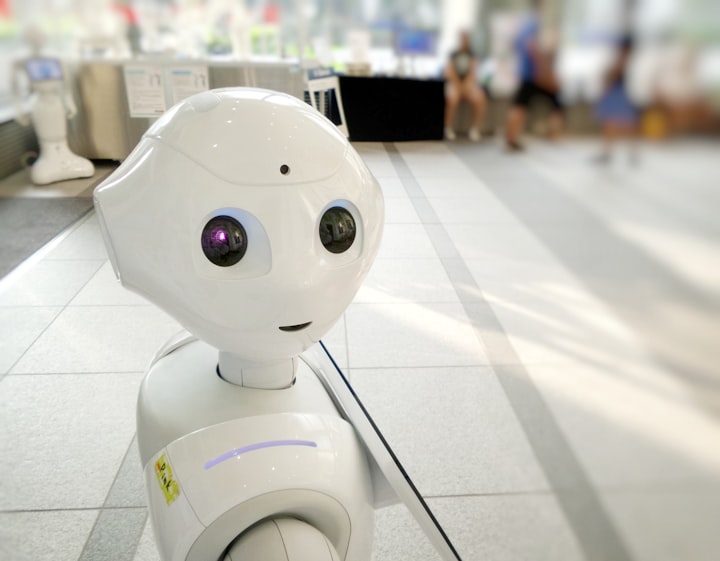Future of Artificial Intelligence
The Revolution of AI and Its Impact on Society

The Revolution of AI and Its Impact on Society
Humans have always sought to improve their lives and technology has been a driving force in this pursuit. It is incredible to see how far we have come from our cave-dwelling ancestors to the advanced technology we have today. Artificial intelligence (AI) is a crucial part of this technological evolution and is currently in a golden age, transforming every industry.
This post serves as a comprehensive guide to the practical applications and future prospects of AI and its impact on our lives. To kick things off, I will offer five bold predictions about the ways AI will fundamentally alter our economy and society in the next decade.
Where We Stand in the AI Revolution
With AI technology advancing rapidly, we will soon rely heavily on it in our daily lives. Many tasks, such as contacting friends, using email, or renting a car, have already been made easier through the use of AI. While it is difficult to fully summarize its benefits and impact on our daily lives, I have highlighted some worth mentioning fields in which AI has taken over quickly.
Using Artificial Intelligence for Navigation
With the development of AI technology, logistics companies are increasingly relying on it for various purposes, including operational efficiency, traffic analysis, and route optimization. A study by MIT found that GPS technology can improve safety by providing users with accurate, timely, and detailed information. The use of Convolutional Neural Networks and Graph Neural Networks can also help users automatically detect the number of lanes and road types behind road obstructions. This can greatly benefit companies like Uber, who aim to provide fast and reliable transportation services to their customers.
Marketers Use Artificial Intelligence to Increase Their Efficiency
Artificial intelligence is having a significant impact on the marketing industry, with many marketers using AI to deliver highly targeted and personalized advertisements. AI can be used for behavioural analysis, pattern recognition, and other methods to better understand and target potential customers. AI can also help with content marketing by using tools like Copysmith.ai, which employs AI to generate text based on hard data.
One of the most advanced AI tools in the marketing industry is Generative Pre-trained Transformer 3 (GPT-3), an artificial neural network that can write in ways similar to humans. It uses a database of all possible phrases to perform incredibly fast, almost as if a human had typed them. This technology is already being used by companies like Copysmith to offer quality content solutions to their customers.
Another application of AI in marketing is customer service, where chatbots powered by AI can analyze a user's language and respond in a similar way to humans. As messaging apps become increasingly popular, brands are using chatbots to provide customer service through their websites, answering common customer questions. These chatbots get smarter over time as they collect more data and learn from each response.
AI can also be used in marketing campaigns to understand the needs of local markets and provide real-time personalization based on user behavior. AI software like cleverTap can provide a suite of analytical tools to help companies understand their users, optimize conversions, and measure success.
The use of Artificial Intelligence in Robotics
Artificial intelligence is also widely used in robotics, with AI-powered robots being able to detect obstacles and plan their journeys in real-time. For example, companies like Savant Automation provide AI solutions for important enterprises such as Toyota and AstraZeneca, which use AI-powered carts and trucks for transporting goods in hospitals, factories, and warehouses.
In the manufacturing industry, AI can also be used for predictive maintenance on the 3DEXPERIENCE platform from Dassault Systèmes. This platform allows manufacturers to take advantage of AI-driven applications to increase productivity and minimize risks at the workplace.
Another application of AI in robotics is inventory control, where companies like FellowAI provide advanced computer vision and robotics systems that use AI to identify and track objects in real time, constantly improving inventory performance.
Gaming and Artificial Intelligence
The gaming industry is another area where AI applications are prominent. AI can be used to create non-player characters (NPCs) that interact with players in a human-like way, making video games more immersive and interactive. AI can also be used for game design, where AI algorithms can analyze player behavior and make adjustments to improve gameplay.
Healthcare and Artificial Intelligence
Artificial intelligence is also making its mark in the healthcare industry, with AI being used for various purposes, including medical imaging, drug discovery, and precision medicine. For example, AI can be used for medical imaging to analyze medical images and assist doctors in diagnosing diseases and conditions. AI can also be used for drug discovery, where AI algorithms can analyze large
AI's Impact on Different Industries in the Future
A recent report by Grand View Research projects that the global AI market will grow at a compound annual growth rate of 46.2% and reach $390.9 billion by 2025. AI integration across various applications is driving this growth, with the most common applications being voice and image recognition. In recent years, AI has disrupted many industries and the trend is expected to continue.
Healthcare: AI is expected to improve healthcare in many ways, from collecting relevant and accurate data to providing predictive and personalized care. AI can assist doctors in making proactive decisions using predictive analytics, remotely monitor patients' health, and provide quick diagnoses using image recognition. The Mayo Clinic has even developed an AI model that predicts a successful vaginal delivery for pregnant women. AI has the potential to reduce operating costs and save the medical industry up to $100 billion annually, and revolutionize patient care by providing personalised treatment plans.
Logistics: AI can have a significant impact on logistics operations, from predicting inventory requirements to optimising routes and reducing overhead costs. Ab InBev, the world's largest beer company, uses AI to predict demand and reduce warehousing costs. AI can also help reduce time spent at customs by digitizing paper documents and using image recognition algorithms and blockchain technology to track shipments accurately.
Fashion: The fashion industry is undergoing a virtual revolution due to COVID-19, with many shows going virtual and digital fashion becoming popular. AI plays a crucial role in simulating digital fashion's movements and reducing the industry's carbon footprint. For example, The Fabricant has reduced its carbon footprint by up to 30% by replacing physical garments during the design and development phases with digital samples.
These are just a few examples of the impact AI is expected to have on various industries in the future. AI has the potential to improve our daily lives and disrupt traditional methods, leading to a more efficient and sustainable future.
AI and Retail
Retail is another industry that has experienced the impact of artificial intelligence. AI has been integrated into various aspects of retail, from product recommendations and personalized shopping experiences to inventory management and customer service. Retailers are using AI to collect data on customers, such as their purchasing behavior and preferences, to better understand their needs and improve their shopping experience.
One of the key ways AI is being used in retail is through chatbots. Chatbots are computer programs that are designed to mimic human conversation, allowing customers to interact with a brand through a messaging platform. Retailers are using chatbots to assist customers in finding products, answer questions, and provide customer support.
Another application of AI in retail is through image recognition. Retailers are using image recognition to identify products and provide recommendations based on customer preferences. Image recognition also enables retailers to monitor their stores, detect product out of stocks, and track inventory levels.
AI is being used in retail to optimize pricing strategies. Retailers are using AI algorithms to analyze data on customer behavior, market trends, and competitor prices to determine the optimal price for their products. This helps retailers to remain competitive and improve their profit margins.
the future of AI in the workplace and our daily lives is looking bright. AI has the potential to transform many industries and improve our lives in countless ways. From healthcare to fashion and retail, AI is providing innovative solutions and disrupting traditional practices. As the technology continues to advance, we can expect to see even more exciting developments and advancements in the years to come.
Artificial Intelligence's Positive Effect on Human Society
In the workplace, AI can improve efficiency and enhance human abilities to complete certain tasks. It allows humans to focus on tasks they excel at, such as creative and empathetic work, while taking over repetitive or hazardous jobs.
On a larger scale, AI's implementation will result in increased job satisfaction and happiness as individuals engage in more fulfilling work, leading to higher productivity, effectiveness, and ultimately, economic growth for a nation and society as a whole.
AI Boosts Global Productivity
The use of AI will save society countless hours of productivity through its introduction of self-driving transportation and other applications that solve traffic congestion problems. People will be relieved from stressful commutes and have more time for other pursuits.
AI also helps combat crime through the use of fingerprint and facial recognition technology. There is potential for AI to greatly assist the justice system, as long as its use does not infringe on individual privacy.
Finally, AI is poised to have a major impact on our daily lives through its ability to enable a remote lifestyle and provide new ways to interact with the world. While there will be challenges as AI continues to expand, its impact on society is expected to be positive.
Conclusion
This article covers all the ways AI will impact our future, based on verified sources and factual data. From its current effects to its future possibilities, AI's future is bright. However, it also brings potential challenges, such as who is responsible in the event of a self-driving vehicle accident, and the need for global management of an independent arms race. The transformational impact of AI on the economy, legal and political systems, and regulation will have far-reaching implications that require discussion and preparation.
There is a debate on the likelihood of machines becoming super-intelligent and humans losing control, but history has shown that new technology often has unintended consequences. AI will shape our future, but there will likely be challenges related to its unintended outcomes.





Comments
There are no comments for this story
Be the first to respond and start the conversation.